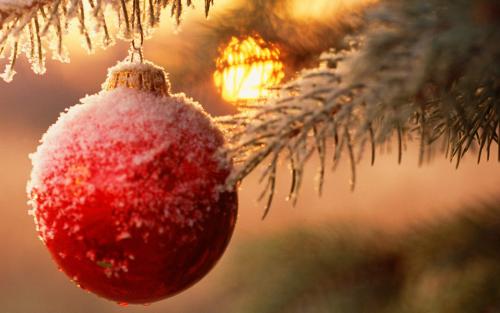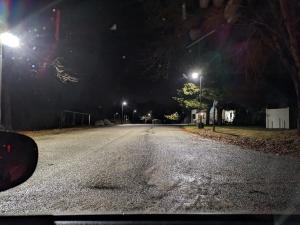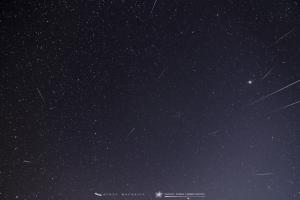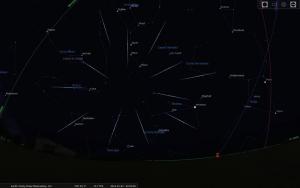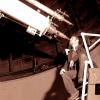Celebration of Space - December 29, 2023
As we quickly approach the close of the 2023 year, we usually think of all the great things that occurred for us at Frosty Drew over the course of the year. Sadly, 2023 was a rather difficult year at Frosty Drew. When speaking among our team, the year appears to be defined as a year of unprecedented clouds, and yet again fighting with the same people in town about the silly idea of lighting Ninigret Park. It was a year with so many wasted opportunities due to these two issues. The irony of this is that both issues are related to each other.
The increase in clouds and severe weather events are related to anthropogenic climate change, and will likely continue to increase in severity. But light pollution is a very important contributor to this type of climate change, in that it directly affects biodiversity and loss of species. It is also connected to increased unnecessary use of energy. The more electricity we use the dirtier it gets in regards to how it is sourced.
What is the most troublesome about the group that wants to light Ninigret Park is that they never go away. This is my second time dealing with this problem in the 14 years I have been at Frosty Drew, and my predecessors have kept detailed notes on how they have dealt with this problem before my time. 2024 is the year that Charlestown needs to codify Ninigret Park as a protected dark sky natural resource! It is embarrassing that a town which is so known for this resource, continually has to fight against its own leaders to protect that resource. Town leaders should be working to better protect, promote, and even monetize this natural resource to better the community and steward this delicate environment.
One good thing that has come from all of this is the sheer number of people in the town, state, and region that have come together to fight for the protection of the dark sky in Ninigret Park. It is truly astounding how many people cherish this resource. It has also served as a wake up call in regards to over-lighting in the region, and many people want to step up their game to address the problem. Of all the issues that are wrapped into anthropogenic climate change, this is the easiest one to fix.
This coming Wednesday-Thursday, January 3-4, 2023, the annual Quadrantid Meteor Shower will peak. Under perfect viewing conditions an observer can witness an increase in regular meteor activity by about 120 meteors per hour. In 2024, the 45% waning crescent Moon will rise just after midnight, which will obscure some of the dimmer meteors. The Quadrantid shower is also the last meteor shower of meteor viewing season, kicking off a lull in notable meteor shower activity until the April Lyrids kick in.
The Quadrantid shower has a very short peak period when compared to other notable meteor showers, which will last for only about 6 hours. Predicting the peak time is difficult, and not always that accurate. At this time, it appears that the peak will occur right around sunrise for EST sky watchers. This doesn’t mean that meteors will not be visible, but that the best views will probably not be accessible for our location.
Additionally, the Quadrantid Meteor Shower is named after the defunct constellation, Quadrans Muralis. The constellation was found in between Draco and Bootes near the end of the Big Dipper’s handle. It gives tribute to the quadrant device, which was used to measure angles in degrees. In modern times, meteors will appear to radiate from a location near the star Alkaid, which is on the end of the Big Dipper’s handle.
If looking to catch a view of the Quadrantid shower, head out to a site with minimal light pollution and be there for 1:00 am. Lay on your back with your feet orientated towards the southwest horizon, and look to the zenith (top of the sky) to catch meteors streaking by. Since predictions of the peak time are not all that reliable, the peak could occur earlier in the night on the 3rd, and even during the daytime hours of the 3rd or 4th. Regardless, let us know if you happen to see any meteors. If weather conditions are optimal, we will be out at Frosty Drew Observatory to watch the shower, so feel free to stop in. Note that we will not offer telescope access during meteor showers in 2024 due to things like this.
This coming Sunday, December 31, 2023, from 7:00 pm - 9:00 pm, Frosty Drew Observatory will host a special two hour window of stargazing for those looking to add the cosmos to their New Year's Eve celebrations. As of now, the weather is looking quite promising for the night. So put the stars on your calendar and send off the year in true geek style. Read about it.
Have a fantastic New Year from all the astro-geeks at Frosty Drew Observatory and Science Center!
- Author:
- Scott MacNeill
- Entry Date:
- Dec 29, 2023
- Published Under:
- Scott MacNeill's Columns

